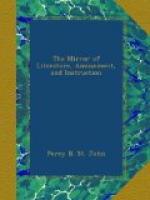“But we must have done with this splendid Festival: we cannot, however, conclude without a remark:—the health of ’Lord Porchester and the Poets of England,’ was drunk; and when his Lordship made his acknowledgments, he was interrupted by the titter of a hundred tongues and sat down, no doubt, feeling that the spirit of nationality was a little too exclusive. We forgot to mention that neither Campbell nor his poem made their appearance, which we regretted for several reasons, and also that the memory of Burns was not drunk out of his punch-bowl. For this relique of the bard, a Jew of the name of Isaac, gave 60_l_. in pledge, and begged the key to keep in memory of the poet, when it was bought by its present possessor; and an Irish gentleman, not long ago, sent a 300_l_. check for it, and threatened Mr. Hastie with the law when he refused to give him up the punch-bowl.”
“We are indebted to a friend for this very pleasant notice, and must, in our predominent love of truth, say so. As far as the presence of numbers could testify general affection for the memory of Burns and respect for the Ettrick Shepherd, the meeting was most satisfactory; in every other respect it was a failure.”
Now let us turn to the Court Journal, which in its first column decides the Burns’ Dinner to have been “the most ill-conceived, ill-concocted, ill-managed, and ill-attended affair of its kind that ever flung disgrace and ridicule on the public hospitality of the most inhospitable public on record.” The advertised list of stewards is described as “hoax the first.” Their names were used as baits—their presence being represented under the ominous forms of half-a-dozen well-known illustrious unknowns, headed by two “enterprising” booksellers! there being not a single distinguished writer present, except Mr. Lockhart, and he evidently cutting the whole affair,—so far I mean as relates to taking any part in the (mis)management of it. Nevertheless, I see by the Papers, that “all the leading characters of the Metropolis were present! the poetical department of them being represented by Lord Porchester, and the prose department by Lord Mahon.” Our Court visiter bears his lot with good humour: but, observes he “not small must have been the contemptuous pity felt for me, by those superior intelligences who, on my entering the Dinner Room, I found had already secured their seats, probably by the only practical method—that of taking possession of them overnight! And there is no denying the wit of this proceeding, on the part of those who were in the secret, that the repast was ordered for two hundred individuals, (nine-tenths of them probably Scotch individuals) and was to be partaken of by four hundred.” This proportion is probably correct, since “nine-tenths,” are the precise proportion of the company gratified.—(See the Gazette.)
Among the elite, or the company at the upper table, “Sir Peter Laurie was one, and Mr. Lockhart was not one: for he sat among the undistinguished at a side table.” Our Court guest also sat at a side table though he pleads guilty to “foul” means—“that of displacing an engine-turned and satine-ed card, which had been deposited therein, as the worthy locum tenens and representative of its owner.”




